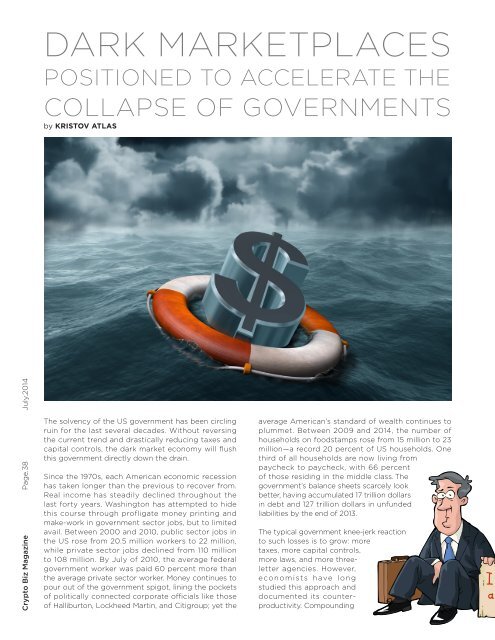Crypto Biz Magazine—July, 2014/Issue.02
Digital Currencies & Crypto Innovations—We observe and explore all aspects of the crypto world, including mining, financial trading, exchanges, development and business.
Digital Currencies & Crypto Innovations—We observe and explore all aspects of the crypto world, including mining, financial trading, exchanges, development and business.
You also want an ePaper? Increase the reach of your titles
YUMPU automatically turns print PDFs into web optimized ePapers that Google loves.
DARK MARKETPLACES<br />
POSITIONED TO ACCELERATE THE<br />
COLLAPSE OF GOVERNMENTS<br />
by KRISTOV ATLAS<br />
Page.38 July.<strong>2014</strong><br />
<strong>Crypto</strong> <strong>Biz</strong> Magazine<br />
The solvency of the US government has been circling<br />
ruin for the last several decades. Without reversing<br />
the current trend and drastically reducing taxes and<br />
capital controls, the dark market economy will flush<br />
this government directly down the drain.<br />
Since the 1970s, each American economic recession<br />
has taken longer than the previous to recover from.<br />
Real income has steadily declined throughout the<br />
last forty years. Washington has attempted to hide<br />
this course through profligate money printing and<br />
make-work in government sector jobs, but to limited<br />
avail. Between 2000 and 2010, public sector jobs in<br />
the US rose from 20.5 million workers to 22 million,<br />
while private sector jobs declined from 110 million<br />
to 108 million. By July of 2010, the average federal<br />
government worker was paid 60 percent more than<br />
the average private sector worker. Money continues to<br />
pour out of the government spigot, lining the pockets<br />
of politically connected corporate officials like those<br />
of Halliburton, Lockheed Martin, and Citigroup; yet the<br />
average American’s standard of wealth continues to<br />
plummet. Between 2009 and <strong>2014</strong>, the number of<br />
households on foodstamps rose from 15 million to 23<br />
million—a record 20 percent of US households. One<br />
third of all households are now living from<br />
paycheck to paycheck, with 66 percent<br />
of those residing in the middle class. The<br />
government’s balance sheets scarcely look<br />
better, having accumulated 17 trillion dollars<br />
in debt and 127 trillion dollars in unfunded<br />
liabilities by the end of 2013.<br />
The typical government knee-jerk reaction<br />
to such losses is to grow: more<br />
taxes, more capital controls,<br />
more laws, and more threeletter<br />
agencies. However,<br />
economists have long<br />
studied this approach and<br />
documented its counterproductivity.<br />
Compounding


